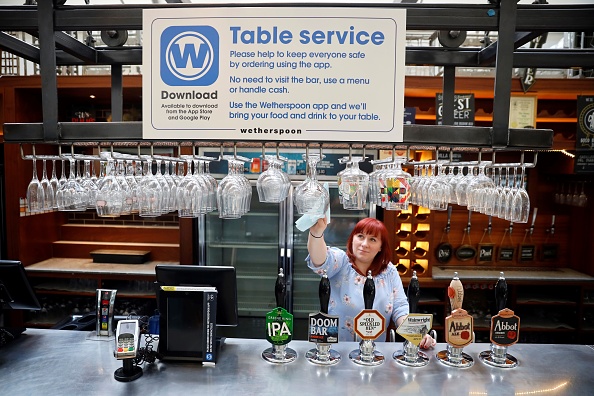WHY THE HOSPITALITY SECTOR IS VITAL IN THE UK
The UK’s economy is primarily a service-based economy, as 81 per cent of the country’s output comes from the service industry. Furthermore, the industry employs 84 per cent of the country’s workforce. While retail and the hospitality sectors were not the only component of Britain’s service sector, they do play a huge role in the country’s economic output. While earlier this month, non-essential shops were reopened for the first time in weeks, many of said stores had to adapt to the two metre rule and had to find ways to make sure customers were maintaining a safe social distance. Nevertheless, most pubs, cafes and restaurants do not have the capacity to keep customers far from each other. Even if they had reopened and comply with the two-metre rule, doing so most likely wouldn’t be profitable. As such, the government’s announcement that they would be allowed to reopen and that people would no longer have to keep two-metres means that pubs and cafes can now operate on a financially viable basis.
IS THE UK READY TO OPEN BACK FOR BUSINESS?
The government’s reluctance to go into lockdown back in March proved to be costly as initial inaction allowed the virus to spread among the public. Even members of the government and the royal family fell victim to the virus. As it stands, the UK has the highest death rate in Europe, and the third highest death rate in the world behind Brazil and the United States. While these figures do paint a grim picture of the situation, both the infection rate and the death rate in the UK has been falling over the last few weeks. On June 22, only 15 COVID-19 related deaths were recorded, the lowest daily rise since March. On June 23, only 921 new cases were recorded across the UK, a stark contrast to early May when over 6,000 new cases were being recorded. These figures indicate that now should be a good time to return to a “new normal”.

HOW OTHER COUNTRIES HAVE DEALT WITH REOPENINGS
As the UK was late in implementing lockdown measures, it was also late in its reopening. Throughout Europe, cafes, bars and schools have been back in business. Thus far, the experiences from other countries do paint a positive picture. Italy, which at one point was the world’s epicenter for the virus, has only been recording 200 to 300 new daily infections. France, which has also opened up but still maintains social distancing measures, is currently only recording 450 cases a day. This doesn’t necessarily mean that the virus is no longer a danger. During the UK’s daily briefings, one criterion that was often cited is the reproduction number or R-number. If a virus’s r number is above one, then each infected person has the potential to infect more than one person. It for this reason that many governments are trying to keep R-numbers below one, but a recent outbreak in a slaughterhouse in North-Rhine, Westphalia has increased the R-number in Germany to 2.88. While for now, it seems that the outbreak is reserved in that region, this is still a stark reminder of how quickly the virus can spread across individuals in confined spaces.
HOW HAVE THE DEVOLVED GOVERNMENTS RESPONDED?
The devolved governments of Scotland, Wales and Northern Ireland seem to agree with Westminster’s sentiment opening up. Nicola Sturgeon’s SNP government in Scotland has given a clear roadmap to coming out of lockdown. Non-essential shops are set to reopen in Scotland on June 29, while on July 15 pubs, restaurants and cinemas will also reopen. However, the Scottish government has not yet decided whether or not it would reduce the two-meter rule and said it would review this regulation in the coming week. Furthermore, the Northern Irish government recently stated that the hospitality sector would be allowed to reopen a day before England, as pubs, hotels and restaurants in Northern Ireland are set for a July 3 reopening. Like its counterpart in Edinburgh, the Northern Irish government has said that it currently has no plans to scrap to two-meter rule in spite of the positive effects it would have on businesses. The Welsh government consisting of the Welsh Labour party members, seems to be the most hesitant to reopen its country. It recently announced that it would not be following the rest of the UK in easing of lockdown, and will decide on when to reopen the hospitality sector on July 9, the date of its next lockdown review. This does not indicate a Labour opposition of easing of lockdown, shortly after Johnson’s announcement Sir Kier Starmer, the leader of the Labour party, welcomed the government’s decision and acknowledged that it was a difficult choice to make. However, he did question the government’s contact-tracing plans as recent news has surfaced indicating that the app the government has developed has shown many defects and deficiencies.
In terms of the developed world, the UK has shown one of the worst performances in combating the virus. However, it seems now that the governments all across the country are prepared to take the steps necessary to ease lockdown. Furthermore, the Prime Minister has stated that he is not taking the decision lightly and that he was prepared to reverse some parts of the changes should local outbreaks happen.









